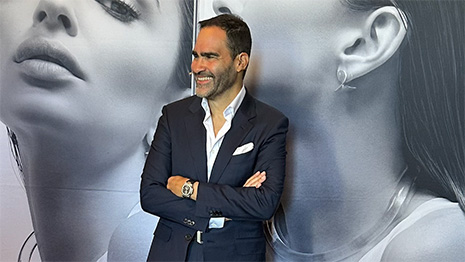 Daniel Langer is the founder and CEO of consulting firm Équité
Daniel Langer is the founder and CEO of consulting firm Équité
During a recent luxury conference, one guest speaker — a self-proclaimed AI expert — presented for about 30 minutes about using artificial intelligence (AI) in the context of luxury.
Her presentation was complex and confusing at best. There were zero key takeaways, with one exception: the speaker mentioned several times that because AI is so complex, companies would have to hire her to help them navigate.
To me, this was a great reminder of how AI has become the latest buzzword.
Balancing practicality and promise
Most companies and experts embrace AI to signal how progressive and competitive they are, yet the practical applications often don’t match the promises made.
Much reminds me of the metaverse hype about two years ago, where practically every brand on the planet tried to have an NFT or a game in Sandbox, without strategizing what the implications are for brand equity building. In the end, 99 percent of projects failed, maybe even 100 percent.
Artificial intelligence has become the latest hype in the luxury industry.
Many brands hail it as the next frontier for innovation. From personalized shopping experiences to streamlined operations, AI promises to revolutionize the way luxury brands engage with their customers.
Yet, as we have seen with many technological advancements, the unbridled enthusiasm for AI can lead to unintended consequences, particularly in a sector that thrives on the human touch. In my point of view, one of the most significant pitfalls luxury brands face when it comes to AI is the risk of commoditizing their offerings.
Luxury is pure emotion and authenticity. It is the ability to create extreme value.
It depends on the ability to create a feeling that each product or service is uniquely crafted for the individual. AI, however, is increasingly becoming a commodity, often operating on the principle of scalability and efficiency, which can dilute this sense of uniqueness.
Automated customer service, AI-driven chatbots and even AI-generated content can make interactions feel generic, stripping away the human-to-human personal, bespoke experiences that luxury consumers expect.
When every customer receives a generic AI-generated response or recommendation, the brand identity starts to get lost. Instead of exclusivity, brands start feeling more like mass-market offerings, losing the distinct qualities that set them apart.
AI vs. artistry
Furthermore, there’s a growing reliance on AI to drive creative processes within luxury brands. While AI can analyze trends, predict consumer behavior, and even generate designs, it lacks the emotional depth and intuition that human creators bring to the table.
Luxury is more than creating aesthetically pleasing products. It is about telling an inspiring story, evoking emotions and creating a connection between the brand and its clients.
AI, no matter how advanced, struggles to replicate the nuances of human creativity. Brands that lean too heavily on AI risk producing products and experiences that feel soulless, eroding the deep, emotional bonds that define true luxury.
Personalization is another area where AI’s potential can quickly turn into a double-edged sword. On the surface, AI’s ability to tailor recommendations, advertisements and shopping experiences to individual preferences seems like a perfect fit for the luxury market.
However, there is a fine line between personalization and intrusion. Today’s consumers are increasingly wary of how their data is used, and AI-driven personalization that feels too precise can come across as creepy or manipulative.
Luxury consumers, in particular, are buying into a lifestyle, an identity. If AI oversteps, turning every interaction into a calculated move based on data points, it risks alienating the very clients it aims to engage.
Moreover, the drive for efficiency that AI brings can be at odds with the principles of luxury. In a sector where scarcity and exclusivity are key to brand value, too much efficiency can undermine these qualities.
AI might optimize production processes and improve supply chain management, but if it leads to an overabundance of products or too much accessibility, the brand’s allure diminishes. Streetwear label Supreme is a great example.
Once one of the most desired brands, it became overcommoditized. Luxury is fundamentally about the exceptional, and AI’s tendency towards optimization and standardization can dilute this.
Strategic approaches
Luxury brands must be strategic about the adoption of AI.
It is a powerful tool that, when used correctly, can enhance the customer experience and streamline operations. But it must be used as an assistant to human creativity and judgment, not a replacement.
Brands that will outperform in an AI reality are those that understand that luxury is about maintaining the delicate balance between innovation and history, between efficiency and exclusivity. AI can help luxury brands evolve, but only if it is applied with the care and precision that the luxury sector demands.
Luxury brands must resist the temptation to adopt AI “because our competitors do it too.” This will accelerate being part of the sea of sameness.
At its core, luxury is about human connection, emotion and the art of making people feel special. AI has a place in this world, but it must be used strategically and wisely, with a deep understanding of what makes luxury unique.
The key questions brands need to ask are "Are we gaining a competitive advantage by applying AI, and if yes, why and how?" and "Are we creating measurable client-centric value and a brand-specific emotional response, or are we just creating the 'better' chatbot?"
If the answer to any of these questions is no, AI won’t be the solution.
Mr. Langer conducts master class management training on various luxury topics around the world. As a luxury expert featured on Bloomberg TV, Financial Times, The New York Times, Forbes, The Economist and others, Mr. Langer holds an MBA and a Ph.D. in luxury management, and has received education from Harvard Business School. Follow him on LinkedIn and Instagram.